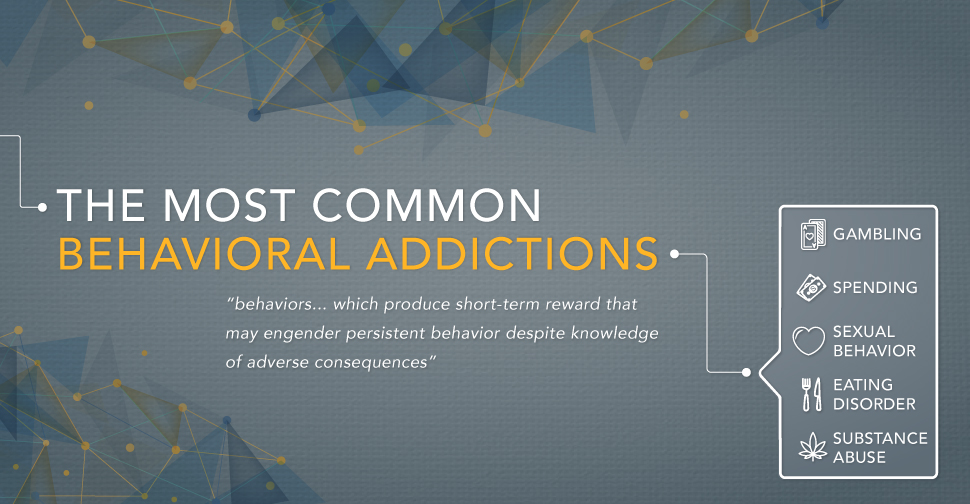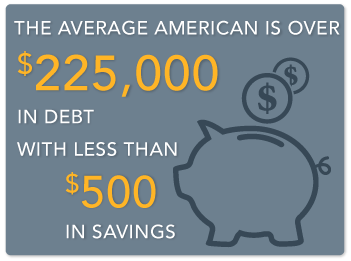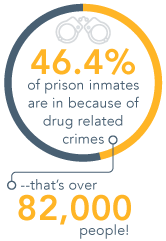
Behavioral Addictions are when an individual does something even if they know it’s wrong and will likely lead to negative consequences. These can include Porn Addiction, Drug Addiction, Gambling Addiction, Food Addiction, or even Internet Addiction. Behavioral Addictions can lead to loss of job, home, marriage, and life. Treatment is often required to help a person to kick their Behavioral Addictions.
You know that feeling when you know something is wrong, but you do it anyways, and it feels great? You might be able to weigh out the pros and cons, before committing an act and decide not to do it. Some might get sucked into a cycle over time and no longer have the ability to decide. Their behavior grows into more of a habit, impulse, or addiction, and sometimes they can feel trapped. These people are likely suffering from a Behavioral Addiction (or impulse-control disorder), which is roughly defined by the National Institutes of Health as “behaviors… which produce short-term reward that may engender persistent behavior despite knowledge of adverse consequences, i.e., diminished control over the behavior.”
What Exactly Are Behavioral Addictions?
Behavioral Addictions, sometimes referred to as impulsive-control disorders, can come with serious negative consequences on a person’s life. There are a lot of different behavioral addictions. Basically, if an action makes somebody feel good, but it can get them into some sort of trouble but they do it anyways–repeatedly, a person might be struggling with a behavioral addiction. These can lead to divorce, bankruptcy, incarceration, homelessness, or in some cases, overdose and death.
There are an abundance of behaviors that can cause addiction, but for now let’s focus on the most common behavioral addictions. Some of the most common behavioral addictions are:
- Compulsive Gambling Disorder–Gambling Addiction
- Compulsive Sexual Behavior Disorder–Porn and Sex Addiction
- Compulsive Eating Disorder (or Binge Eating Disorder)–Food Addiction
- Compulsive Spending Disorder–Buying Addiction
- Substance Use Disorder–Drug Addiction
Negative Consequences Of Behavioral Addictions
 The reasoning for these addictions can be tough for bystanders and sufferers to swallow, especially after the adverse consequences have taken place. A person might go “all in” with their kid’s college fund if they’re suffering from a compulsive gambling disorder. A teenager might flunk out of school if they are suffering from a video game addiction. A person might become a diabetic if they’re suffering from a compulsive eating disorder or even an alcohol use disorder. A woman might leave her partner because of his obsession to pornography and sex. The negative consequences of behavioral addictions could go on forever…
The reasoning for these addictions can be tough for bystanders and sufferers to swallow, especially after the adverse consequences have taken place. A person might go “all in” with their kid’s college fund if they’re suffering from a compulsive gambling disorder. A teenager might flunk out of school if they are suffering from a video game addiction. A person might become a diabetic if they’re suffering from a compulsive eating disorder or even an alcohol use disorder. A woman might leave her partner because of his obsession to pornography and sex. The negative consequences of behavioral addictions could go on forever…
Understanding Behavioral Addictions
A person suffering from behavioral addictions can have a hard time wrapping their head around why they ever took part in something that had such gloomy reaction from the rest of the world. For some people, treatment is the only way to get their head on straight. For others, their negative consequences will be their saving grace, and they will continue beating their head against the wall asking “how the hell did I get here again?” They might need to hit complete “rock bottom” before their addiction or obsession becomes clear to them.
Negative Consequences Of Compulsive Gambling

Have you ever been to the casino and see a person white-knuckling the roulette table as their friends persistently try to pull them away? Or have you been that person feeding token after token into the slot machine with the idea that the next token will be the big winner?
The National Institute of Health describes gambling as a “prevalent legalized activity that can be considered a non–drug-related behavior with addictive potential.” They go on to say that 86% of adults gamble at some time in their life. When abused, gambling can lead to consequences like failed relationships, bankruptcy, and even homicide.
Negative Consequences Of Compulsive Sexual Behavior

First of all, porn addiction is a symptom of a compulsive sexual behavior disorder, but because they can sometimes be so closely related, they have been placed in the same category. The porn industry is a multi-billion dollar a year industry which affects just as many people. The first time a person sees porn can happen at a pretty young age, and without realizing it, they can become addicted to that behavior and can continue on habitually viewing pornography until it leads to negative repercussions.
Porn and sex addiction can lead to infidelity and often, consequently, divorce. Speaking with a professional behavioral therapist about the problem can sometimes be the best way to deal with an addiction to sex or porn.
Negative Consequences Of Compulsive Eating Disorder

Using any substance can make a person feel good; whether it’s a drug, a drink, or a comfort food–abusing the said substance can also lead to an addiction. With a compulsive eating disorder, a person might binge and purge, or simply binge eat until they feel sick and sometimes ashamed. The fact is, the brain craves euphoria, and something that makes the body feel terrible can make the brain feel amazing–or at least for a little while. Compulsive eating disorders can lead to various negative consequences including, but not limited to, lowered self image and self esteem, obesity, and other conditions like hypoglycemia and diabetes.
Negative Consequences Of Compulsive Spending Disorder

There is something to be said about a new pair of shoes, a new car, or a new Blu-Ray movie. Sometimes it just feels good to splurge and treat yourself to something new, because you deserve it, right? Well some people spend money to the point that they can’t stop, and maybe the euphoria of having new things, or keeping up with the Joneses is just at the brink. In a report by Investorplace, the average American is over $225,000 in debt with less than $500 in savings, yet we continue spending money outside of our means. Compulsive spending disorder can lead to bankruptcy, unpayable debt, and sometimes homelessness.
Negative Consequences Of Substance Use Disorder

Substance abuse disorders can lead to violence, relapse, bankruptcy, health problems, divorce, homelessness, and early death. Substance abuse is commonly associated with drug addiction–or when a person completely lacks control over their drug use, no matter who or what it hurts. A person suffering from a drug addiction might go to great lengths to get their drug of choice; whether it’s marijuana, alcohol, cocaine, prescription drugs, heroin, or meth (and more). Addiction can lead to all sorts of other behaviors and physical (or mental) consequences such as stealing, homicide, withdrawal, delusions, and pathological lying.
 Substance use disorders can even land a person in prison, in fact, according to the Federal Bureau of Prisons 46.4% of inmates in prison are there because of a drug related crime–that’s over 82,000 people!
Substance use disorders can even land a person in prison, in fact, according to the Federal Bureau of Prisons 46.4% of inmates in prison are there because of a drug related crime–that’s over 82,000 people!
Treatment Of Behavioral Addictions
Behavioral Addictions are not a moral failing–some people just end up at the wrong place at the wrong time. Addiction is the brain’s natural reaction to an action, because it longs for that feel good effect of euphoria. There are a variety of different treatments for Behavioral Addictions, some might include:
- 12-Step Programs
- Cognitive Behavioral Therapies
- Community Outreach Programs
- Medication
- Inpatient Treatment
- Outpatient Treatment
Someone who is seeking help with a Behavioral Addiction might not know where to start. There is nothing wrong with not knowing the answer, but we can help you find yours. If you feel alone, afraid and powerless over your addiction, please call us today all us now to speak to a friendly advisor, and we can get you on the path to wellness and recovery. 1-833-473-4227 Together we can live a better life!
Sources
National Institute of Health – Introduction to Behavioral Addictions
Investorplace – Report Average American In Debt
Federal Bureau of Prisons – Statistics Inmate Offenses


